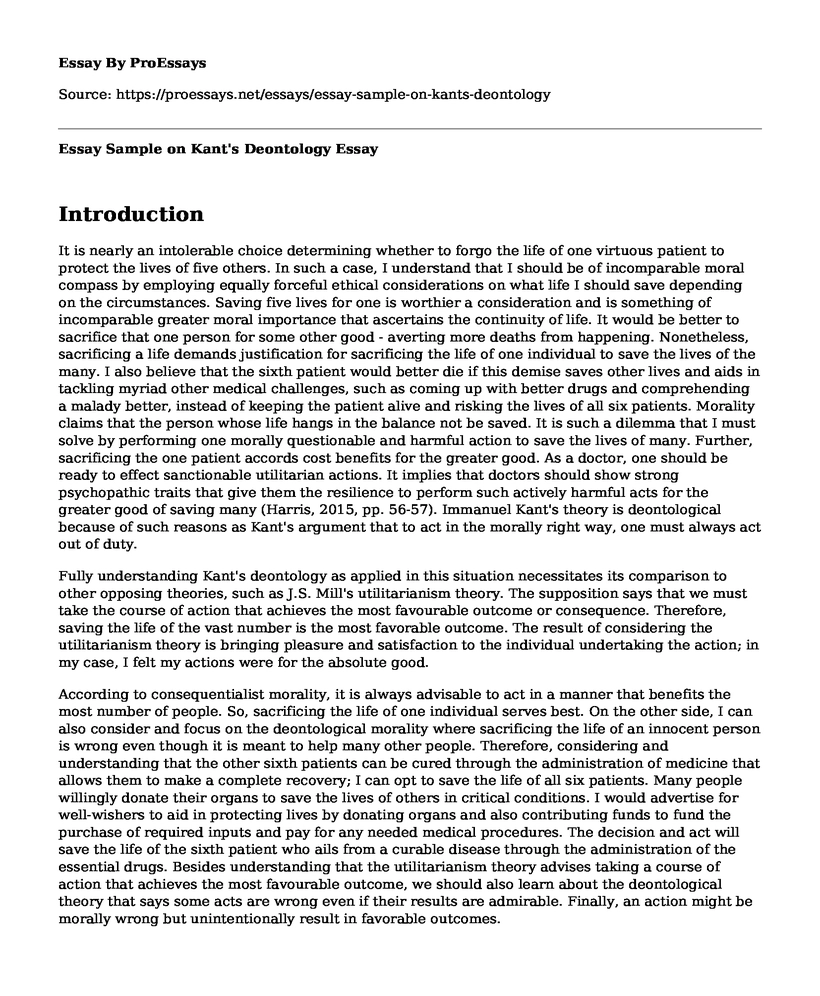Introduction
It is nearly an intolerable choice determining whether to forgo the life of one virtuous patient to protect the lives of five others. In such a case, I understand that I should be of incomparable moral compass by employing equally forceful ethical considerations on what life I should save depending on the circumstances. Saving five lives for one is worthier a consideration and is something of incomparable greater moral importance that ascertains the continuity of life. It would be better to sacrifice that one person for some other good - averting more deaths from happening. Nonetheless, sacrificing a life demands justification for sacrificing the life of one individual to save the lives of the many. I also believe that the sixth patient would better die if this demise saves other lives and aids in tackling myriad other medical challenges, such as coming up with better drugs and comprehending a malady better, instead of keeping the patient alive and risking the lives of all six patients. Morality claims that the person whose life hangs in the balance not be saved. It is such a dilemma that I must solve by performing one morally questionable and harmful action to save the lives of many. Further, sacrificing the one patient accords cost benefits for the greater good. As a doctor, one should be ready to effect sanctionable utilitarian actions. It implies that doctors should show strong psychopathic traits that give them the resilience to perform such actively harmful acts for the greater good of saving many (Harris, 2015, pp. 56-57). Immanuel Kant's theory is deontological because of such reasons as Kant's argument that to act in the morally right way, one must always act out of duty.
Fully understanding Kant's deontology as applied in this situation necessitates its comparison to other opposing theories, such as J.S. Mill's utilitarianism theory. The supposition says that we must take the course of action that achieves the most favourable outcome or consequence. Therefore, saving the life of the vast number is the most favorable outcome. The result of considering the utilitarianism theory is bringing pleasure and satisfaction to the individual undertaking the action; in my case, I felt my actions were for the absolute good.
According to consequentialist morality, it is always advisable to act in a manner that benefits the most number of people. So, sacrificing the life of one individual serves best. On the other side, I can also consider and focus on the deontological morality where sacrificing the life of an innocent person is wrong even though it is meant to help many other people. Therefore, considering and understanding that the other sixth patients can be cured through the administration of medicine that allows them to make a complete recovery; I can opt to save the life of all six patients. Many people willingly donate their organs to save the lives of others in critical conditions. I would advertise for well-wishers to aid in protecting lives by donating organs and also contributing funds to fund the purchase of required inputs and pay for any needed medical procedures. The decision and act will save the life of the sixth patient who ails from a curable disease through the administration of the essential drugs. Besides understanding that the utilitarianism theory advises taking a course of action that achieves the most favourable outcome, we should also learn about the deontological theory that says some acts are wrong even if their results are admirable. Finally, an action might be morally wrong but unintentionally result in favorable outcomes.
Reference
Harris, J. (2015). Value of life: an introduction to medical ethics. Place of publication not identified: Routledge.
Cite this page
Essay Sample on Kant's Deontology. (2022, Apr 04). Retrieved from https://proessays.net/essays/essay-sample-on-kants-deontology
If you are the original author of this essay and no longer wish to have it published on the ProEssays website, please click below to request its removal:
- Research Proposal on Quality Care in Hospice Setting
- Essay Sample on Epidemiology
- Risk Communication in Time of Radiation Disaster Essay
- Company: Microsoft Corporation
- Essay Sample on Hospital Versus Home Births
- Paper Example on Nurse Practitioners: A Growing Need for Quality Healthcare
- Epidemiology in Nursing - Free Article Example







